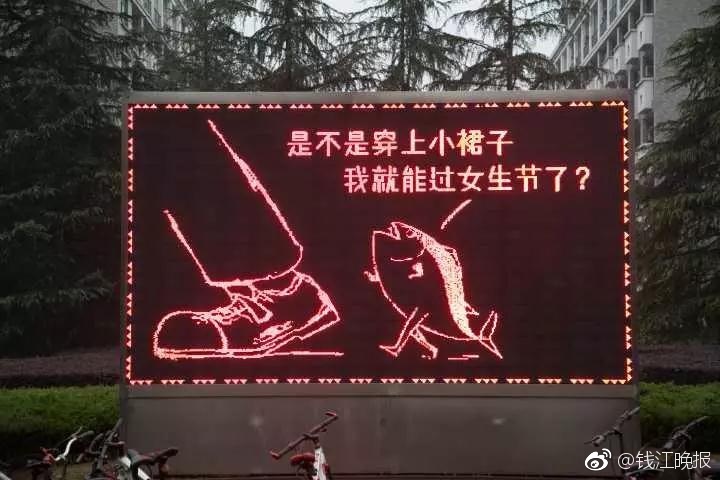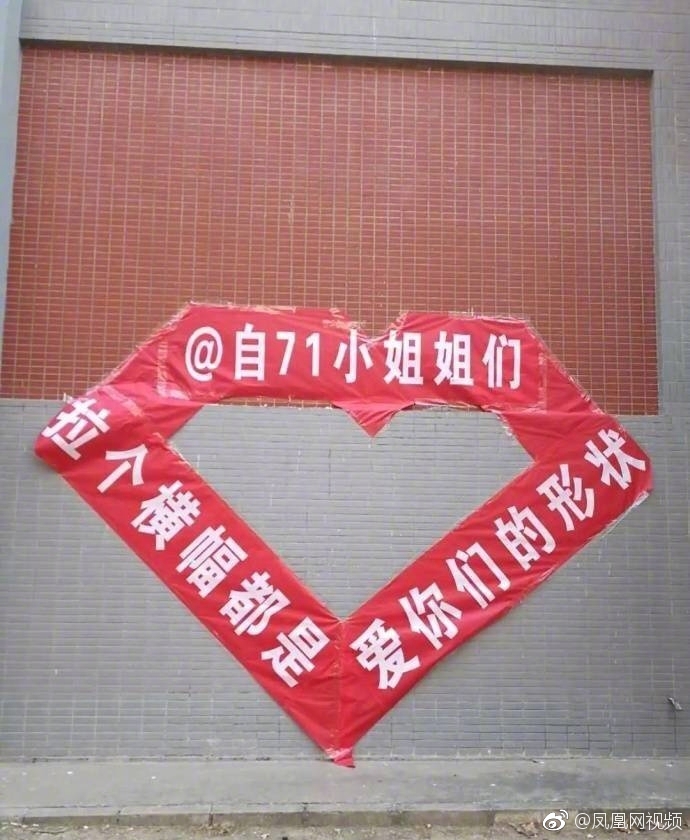Girls’ Day banners on Chinese college campuses are blatant harassment
Girls’ Day banners on Chinese college campuses are blatant harassment


Today, March 8, is International Women’s Day, a global event to celebrate women’s achievements in all fields of life. And this year’s commemoration, in the age of the #MeToo movement, arrived with a particular sense of importance and urgency.
However, while 2017 awakened women and men all over the globe to the hard reality that gender discrimination and sexism are still prevalent and persistent, male students at Chinese universities demonstrated complete obliviousness to this critical moment as they put up sexist, creepy, and generally meaningless red banners on campuses on “Girls’ Day,” March 7, in the name of showing affection for their female counterparts.
Created by some students at Shandong University in 1986, Girls’ Day, in theory, was designed to “foster communication between male and female students at universities.” In the years that followed, it gradually became an alternative holiday for Chinese college girls, who’d rather celebrate Girls’ Day than International Women’s Day due to their abhorrence of the word women (妇女 fùnǚ), which often refers to women over 30 and sounds rather housewifey.
Girls’ Day is inherently problematic, as it is based on age discrimination. Also, the way it is celebrated each year, normally by male university students making banners with slogans that are sexist and encourage stereotypes about women, only makes the holiday more horrendous.
Below are a selection of banners that appeared on Chinese college campuses this year:
Zhejiang University:

Chinese captions: “Flowers in Lantian are no prettier than you at forever 18.”
“Those who know you will travel across mountains and rivers. Those who don’t know you will suggest you drink more hot water.”

Chinese caption: “Can I also celebrate Girls’ Day if I wear a little skirt?”
Hunan University of Science and Technology:

Chinese caption: “I need no male friends if girls look back at me [when I walk past].”

Chinese caption: “The gender ratio at my school doesn’t bother me because you’re the only one I care about.”
Kunming University of Science and Technology:

Chinese caption: “I can’t stop thinking about you. Will you marry me tomorrow?”

Chinese caption: “Everything tastes bitter to me, but you have a strawberry flavor.”
Tsinghua University

Chinese caption: “@Girls from the class of ’71. We love you so much that even our banner is in a heart shape.”
Finally, as noted by Pei Li, China consumer correspondent at Reuters, some students at Tsinghua’s law school landed themselves in trouble by making references to China’s recent removal of its presidential term limits in their banners.

Chinese caption: “I want to extend my time being your classmate.”
Chinese caption: “There is no time limit of loving you. If there is one, I’ll remove it.”
Chinese caption: “A country can’t exist without a constitution. I can’t live without you.”
Chinese caption: “I want to continue to be your boyfriend.”
But these banners did not last long. The message below was circulated on WeChat by Tsinghua students:

Chinese caption: “The banner that reads ‘There is no time limit of loving you. If there is one, I’ll destroy it’ was removed 10 minutes after it was put up. The person responsible will be seriously investigated.”
It’s clear that despite the holiday’s intention, most of these banners actually do no good for male students in China to form a healthy conversation with their female classmates or to make them feel respected. Instead, they only came off as awkward, sexist, and especially ignorant in this particular time. And some of them even border on sexual misconduct, such as the controversial one that appeared on the campus of Shandong University, where the holiday originated, and went viral on the Chinese internet after three female students protested in front of it, calling it “sexual harassment.”

Chinese caption: “Your children can have 26 or 27 adoptive fathers.”

In an article to explain their opposition, the girls wrote:
“There are 27 boys in the class. If one girl is married to one of these boys and has a child, then the child will have one biological father and 26 adoptive fathers. If she doesn’t get married to any of them, then the 27 boys will all be her child’s adoptive fathers. To further explain, these boys wanted to convey two messages to their female classmates that one of us will potentially be the father of your future child, and if none of us will marry you, we still want to be your child’s adoptive father. What underlies the thinking of ‘Being your kid’s adoptive father’ is actually a kind of sexual suggestion. It’s implicit and subtle.”
For many years, this banner culture evolved and spread without much scrutinization from society. But hopefully, this year can be a tipping point, as an increasing number of Chinese college girls are coming forward to express their disgust at Girls’ Day and those banners. As many of them rightly pointed out on social media, there are thousands of ways for college boys to show their willingness to support women, and creating these banners is absolutely one of the worst.






